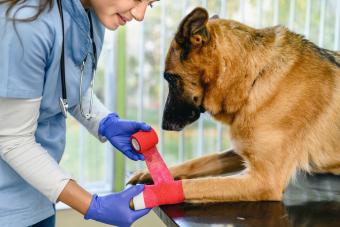
Most dogs are healthy and happy, and your dog is probably no exception. However, some dogs can develop a number of different medical conditions that may require treatment, including canine allergies. A variety of reactions can cause symptoms such as itching and scratching, redness around the paws and eyes, hair loss, dry skin, secondary infections, or more.
Allergies Can Cause Itchy Paws
Itchy paws in dogs are a common problem, and it can be difficult to pinpoint the cause of your dog's discomfort. The most likely culprits are fleas, allergies, or dry skin. The best way to determine what's causing your dog's itchy paws is to take a look at their paws and see if there are any signs of flea bites or any other irritants. If you notice fleas or other insects on your dog's paws, you'll want to talk to your veterinarian about how best to treat them.
If you don't notice any irritation on your dog's paws and they still seem uncomfortable, it could be they have allergies related to food or something else in their environment. You'll have to eliminate potential causes one by one.
Isolate the Trigger
Isolate the trigger and help your pup to avoid it as much as possible. If you can't make sure your dog avoids the trigger, try to cover your dog's paws or clean them after exposure.
Grass, pollen, dust mites, food, and more can all be triggers for your dog's itchy paws. If you know what your dog has been exposed to recently or if they have a history of seasonal allergies, then it might help to consult with your vet about possible allergies that could be causing their issues.
It's important to note that not all dogs will suffer from itchy paws, even if they are exposed to the same triggers as other dogs. You may want to try keeping your dog indoors for a few days to see if they improve before taking any other action.
Clean Your Dog's Paws
Clean your dog's paws in warm water and soap periodically. This will help reduce the risk of any infections developing. Use a mild, non-irritating soap for the best results.
Rub the paws in a circular motion to clean between your dog's toes. Rinse with warm water. Never use water that is too hot or cold, as it may irritate the skin further. Then, dry the paws thoroughly with a towel or blow dryer on low heat, as this can irritate sensitive skin and make itchy paws worse.
One of the most common causes of itchy paws is a bacterial infection. Your dog may have come into contact with bacteria on the ground, or in their food and water bowl. Cleaning their paws can help reduce the itchiness associated with the infection until you book an appointment with your veterinarian.
Use Anti-itch Shampoo
The shampoo will help to soothe your dog's paws, which is highly recommended for dogs that have a bad case of the itchies. As with any other product you use on your pet, be sure to read the label carefully before applying it to your dog's skin or coat. For example, some shampoos contain chemicals that can be harmful if they get into your pet's eyes or mouth.
Use anti-itch shampoo for dogs in small amounts and only on the affected areas of their paw pads. Use it only if your dog's paws become itchy, and don't use it too often! For best results, when cleaning their paws with anti-itch shampoo formulated specifically for dogs, wash every couple of days until there are no signs of irritation left behind. This period usually lasts a couple of weeks.
Topical Options

If you have found that your dog is suffering from itchy paws, it is advisable to consult with your vet before attempting any at-home remedies. Your vet might prescribe a topical spray or cream for the affected areas. A prescription should only be used after consultation with your vet, as some dogs may be allergic to certain ingredients in creams and sprays.
Apply these products e carefully and consistently to the affected areas only. How much you need to apply depends on how bad the problem is, but generally speaking, one application per day will suffice unless advised otherwise by your vet.
You should not use these products more than prescribed by your vet because they can cause skin irritation if applied excessively or used long term without expert advice.
What to Avoid
Avoid letting your dog's paws come into contact with herbs like rosemary, basil, thyme, mint, or sage. These herbs may cause irritation or allergic reactions on their paws. They may also cause digestive disturbances in your pet as well as liver and kidney damage if ingested regularly for a long period of time. Heart problems have also been reported after prolonged ingestion of these plants.
Topical Sprays Containing Alcohol
Avoid using topical sprays containing alcohol, as these can irritate your pet's skin. Alcohol can cause the skin to dry out, crack, and become itchy and red. Even if you don't notice any reaction on the surface of your dog's paws, avoid applying products with alcohol in them for long-term use because eventually, they will start to break down your dog's skin barrier and cause irritation.
Hot or Cold Compresses
You should never apply hot compresses to your dog's itchy paws, as this can cause pain and discomfort for them. Likewise, you should also avoid applying cold compresses to the affected area, as this may worsen the problem by causing ice burns on their paws.
Visit the Veterinarian
If you're unsure of what is causing your dog's itchy paws or they become overly irritated, schedule an appointment with your veterinarian. If you're more focused on holistic remedies, you may elect to book an appointment with a holistic veterinarian rather than a traditional vet. They are often more well-versed in home remedies than other practitioners.







